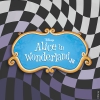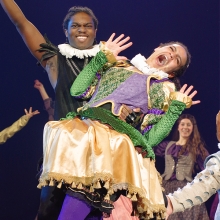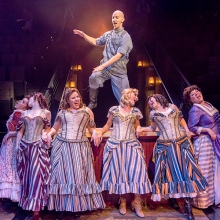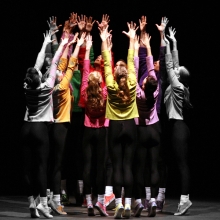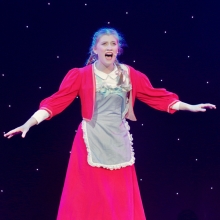Broadway Junior Customer Spotlight: The Penguin Project
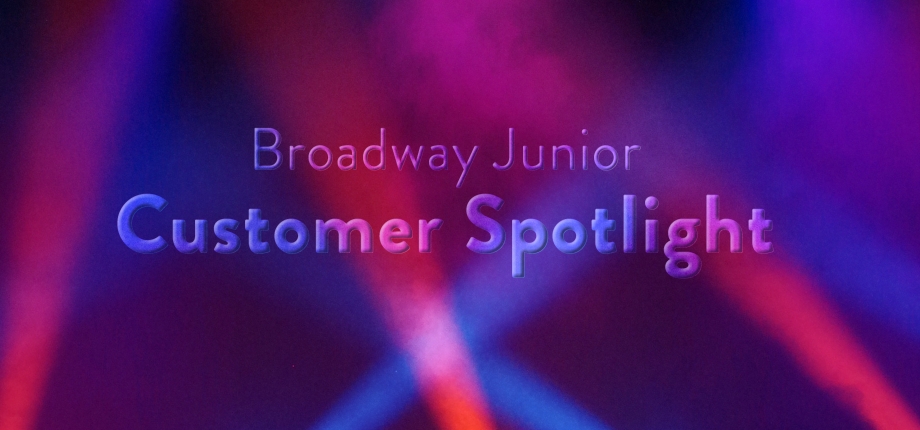
Broadway Junior Customer Spotlight: The Penguin Project
As part of the 20th Anniversary of the Broadway JR. series, we are pleased to profile outstanding theatre programs that have used Broadway JR. to its fullest potential.
This month, we highlight The Penguin Project in Peoria, IL!
Founded by Dr. Andrew Morgan, or “Dr. Andy” as he is more informally known, The Penguin Project puts on a musical once a year performed by children with special needs. The mission is to provide the benefits of theatre arts to children who, otherwise, may not have the opportunity to perform. They strive to demonstrate that those with special needs are not only capable, but just as dedicated and enthusiastic about “community activities” given the right support. The origin of their name, moreover, sums up this mission in a truly lovely metaphor: “The … ‘Penguin Project’ comes from the unique characteristics of penguins. They are extremely playful and curious, and work well together. More importantly, they have a ‘disability’ that distinguishes them from other birds – they can’t fly! Instead, penguins waddle and toboggan on their bellies over the snow, and are excellent swimmers in the water. So like our young artists, they have adapted to the challenges of their environment, and have not allowed their unique difference to interfere with their lives.” (per their website)
The group is open to anyone with a developmental disability, and is ages 10-21. They team with Peer Mentors who assist the performers on stage, and have partnered with a nearby community theatre, the Eastlight Theatre, who provide full technical and production support. With this intensive support from their community, the group rehearses for a period of a few months before putting up a full scale production of a Junior musical.
I sat down with the founder of The Penguin Project (well, sat down to email, I should say. We sat together in cyber-space) to talk more about his program.
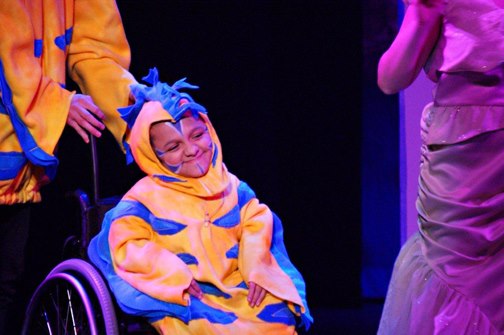
Flounder in The Penguin Project's production of Disney's The Little Mermaid JR. (Photo from The Penguin Project's Facebook Profile).
Q: Reading up on the founding of your company, it seems that you married your medical practice as well as your love of theatre. How did you get involved in the theatre, and why did you choose this specific artistic outlet for children?
A: This could be the basis for a book on the project! I moved from the east coast to Dallas Texas in my junior year of High School and found myself in very unfamiliar surroundings. My main interests at that time were basketball and music. In Texas, high school revolves around football. I was a folk-singing guitar player, not a talent considered to be a priority in Texas at the time, and entered the school talent show. To my amazement I won the talent show and was then approached by the choir director to join the school choir. That led to my first taste of theatre and I was cast as Sir Edward Ramsey in “The King and I.” I learned that theatre was a great way to develop confidence, make friends, and have fun. I continued to do theatre in college and even medical school (I was cast as Conrad Birdie in a community theater production of Bye Bye Birdie).
When my family moved to Peoria IL, I once again found myself in unfamiliar surroundings and once again turned to theatre. I became actively involved as an actor, singer, dancer, director, and choreographer. In fact my whole family, my wife and three daughters became involved and the majority of our time, individually and as a family, was spent at one of the theatres in town. Theater became the center of our social life and where we made almost all of our friends. It was really the only thing that kept us in Peoria.
As I watched my children over the years, I realized how much their theatre experiences impacted their social skills, their communication skills, and their self-esteem. I realized that these are the very skills that my patients with disabilities were lacking. I also realized that children with disabilities had few social outlets and very limited opportunities to participate in community activities like their pers. And so the Penguin Project was born.
Q: That’s fantastic. Can you tell me more about the Peer Mentors that work with the students? The age ranges of the mentors are staggering— it’s so impressive how many KIDS you get involved. Are these volunteers typical theatre people, or are any studying to be medical practitioners? How do you get a ten-year-old involved as a Mentor?
A: The peer mentors are the “backbone” of our program. They are truly amazing how they give up so much of their time to be involved. We estimate that they spend minimum of about 100 hours being part of the process. They come from everywhere. Some are sibs of kids with disabilities or have friends or family members with disabilities. Others have heard about the program or have seen a production and want to be involved. Most do not have a theatre background and have never been involved in theatre before joining us. We don’t recruit actively – they just show up and get involved. Many have been involved for 5-6 years. I don’t know of anyone who is going to be a doctor, but many get involved in fields related to disabilities – nurses, special ed teachers, therapists, etc. We provide training sessions and guidance along the way, but most of the good mentors just have an innate “feel” of what to do. We have had 8, 9 and 10 year old mentors who are fantastic and just seem to know how to jump in and be a friend and helper. It’s an amazing thing to watch. They just really seem to enjoy what they are doing.
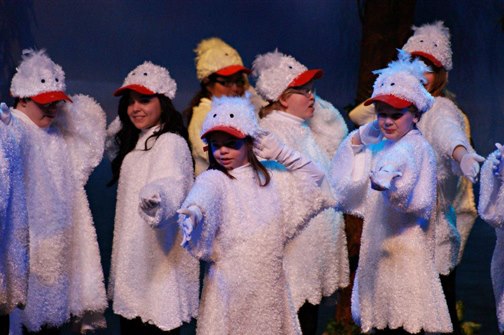
The cast of The Penguin Project's production of Disney's The Little Mermaid JR. (Photo from The Penguin Project's Facebook Profile).
Q: You mention that your peer mentors are part of the production and blend in. Can you elaborate on that? Do you make the mentors more characters or are they more an extension of the performer they assist?
A: We try to costume mentors to complement their partners. Usually, they wear the same outfits – leads and chorus. This includes hats and accessories. Girls who mentor boys are usually dressed as boys, unless it works for them to be boy-girl. One young lady who always mentors the same young man with Down Syndrome was thrilled when she got to wear a dress in Seussical when he was the mayor and she was his secretary. If the lead has a costume that is built, the mentor is costumed similarly, but may not as elaborately. Flounder in Little Mermaid was in a wheelchair and wore a one piece while his mentor’s costume was made from the same striped material and went down to his knees. In Annie, the young lady who mentored Daddy Warbucks was costumed as his chauffeur – complete with top hat, tails, and moustache! We had one boy who mentored his sister in “Seussical” who was a bird girl. So he became a “bird-boy” with vest and tights and feathers – had a ball. I have often had audience member’s comment that they often can’t tell who is the artist and who is the mentor. Everyone just blends in together. If an artist forgets a line (which rarely happened), the mentor just leans in and feeds it to them – usually is way that the audience never notices.
Q: That’s wonderful. About how many performers do every production?
A: To accommodate everyone on stage, we have set a limit of 60 children total in the production. That is why we have had over 90 kids in each of the last 5 productions!! I just don’t have the heart to tell kids they can‘t be in the show. Even so, there have been a few years, where we had to turn some kids away. I have gotten creative with the staging, sometimes splitting the group in half and have each group do half of the numbers. This past year, everyone was one stage for every number, but we alternated who danced and who stood in the background and sang. If I want everyone in a number, we typically have some kids in the aisles – both the kids and the audience love that.
Q: We all know how invaluable a theatre experience can be for a kid growing up. Aside from being fun, children can become more outgoing, confident and social. Can you think of any specific examples of kids who have truly blossomed due to their involvement in theatre?
A: There are so many special things that have happened related to the program. There’s the kid in Annie who was so shy he hid in the supply closet for about a month of rehearsals and then literally had to be dragged off stage after the bows in the production. There’s the kid with CP who stood up on his own for the first time during 76 trombones in Music Man. My favorite story is about the young man with Autism who was so overwhelmed at rehearsal his first year that he crawled into a ball in the middle of rehearsing a dance number. Three years later he was the male lead, touching and initiated interaction with his fellow performers. I later learned that his mother was ready to put him in a residential facility because he was so socially inappropriate before he joined us. There the young man who wanted to commit suicide because he was so unhappy because he had no friends and was bullied so badly at school, who found friendship and happiness in the program and became a “big brother” to everyone. We have lots of stories of kids who barely said anything who started conversing interactively with their families and friends after being in the program, kids who did not do anything socially who became active in their schools and churches, and kids with significant disabilities who developed social skills and were able to get jobs.
Q: What are some of the highlights from your last show?
A: We just finished “Singin in the Rain”, and had a great time with dances and costumes of the period. The highlight for me was watching the young man who played Don Lockwood light up when he sang his solo in “Singin in the Rain.” No one could believe he had the academic ability of a 1st grader. I loved watching him grow with the role over time. I also loved watching our Lina do such a great job with the voice and accent, and our trio do a great job with “Good Morning.”
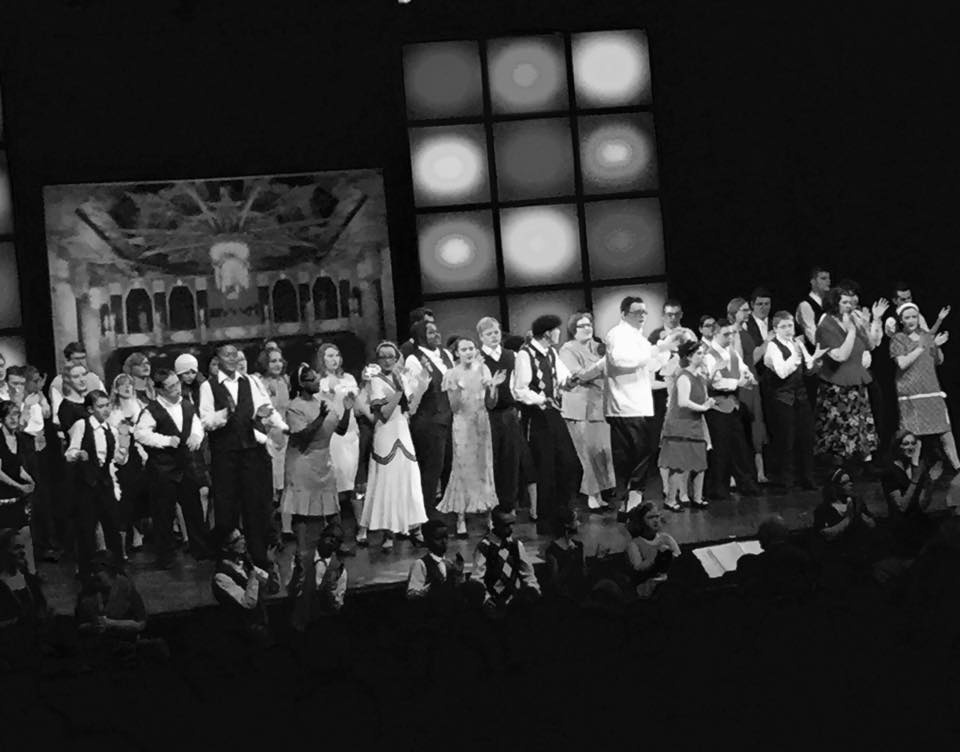
The cast of The Penguin Project's production of Singin' in the Rain JR. (Photo from The Penguin Project's Facebook Profile).
Q: Aside from looking at titles that excite you, what informs your show choices? Do the kids and volunteers have any say in suggesting the next show?
A: We always do “junior” versions of shows, since many of our kids could handle a show that lasted 3 hours. We love the way junior versions move along, but still include all of the important songs and dialogue. To be very honest, we prefer to do MTI Jr shows because of the great packaging and the great support. The kids LOVE getting the souvenir books and the staff love everything that is included. Without MTI’s the junior collection, I don’t think we would have been as successful.
The first criteria is a show with lots of musical numbers – our kids would love singing and dancing and would be bored to tears if there wasn’t a lot for them to do. We need to have a show that gives the chorus a lot to do. We like to have a show with a lot of leads – both big parts and small parts – to challenge kids at different cognitive levels and give as many kids as possible as chance to have a speaking role. And we like shows where there are very small parts – one or two lines – to give even those kids with severe challenges a chance to be in the spotlight.
Although the kids love “Disney” shows, they also like more serious shows with a real story line. They love “Fiddler” and “Millie” and had a great time this year with “Singin in the Rain.” We try to teach them about the story and themes of the show, so they learn about history and about relationships.
Q: What are you most excited about for your next show?
A: We haven’t decided what we are going to do next year. But we’ll keep our eyes open for what is coming down the road at MTI!
**
How To Bring The Penguin Project to Your Community
We at The Penguin Project have developed a comprehensive replication process to help bring the “magic” of The Penguin Project to other communities. We currently have 12 other sites around the country and are looking to add others. If anyone is interested in developing a Penguin Project in their community, please contact me at amm@penguinproject.org.
**
Thank you so much to Andy Morgan for speaking with us and for all the good work you do!
To check out more on The Penguin Project, visit their website at www.penguinproject.org
Share
Callboard
-
Shake and shimmy it with the #Hairspray20Challenge! Join MTI and Broadway Media in celebrating 20 years of #Hairspray. Duet this here or find us on TikTok! Special thanks to @broadwaymedia and @jammyprod. Choreography Guides are a licensor official resource that provides step-by-step instruction from Broadway and professional choreographers for your productions! Visit @broadwaymedia to learn more. #mtishows #youcantstopthebeat #hairspraymusical #goodmorningbaltimore
View on Instagram









